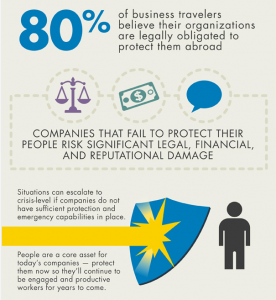No matter what your company’s travel risk management (TRM) goals may be, you’ll want to take action before you lose momentum. To help you get a quick start, here are 7 resolutions we think any risk professional should vow to make—and keep—through the new year.
- Set Benchmarks: You recognize that when an employee travels as part of their job, your company has a legal and moral responsibility to ensure their safety. However, have you gone a step further to evaluate how your company’s duty of care standards line up with the rest of the industry? This involves not only looking to existing laws, but also seeking out similar businesses and evaluating their current best practices. Benchmarking others enables you to learn from their successes (and shortcomings), and also create your own roadmaps for enhancements.
- Gain C-Level Buy-in: There’s really no doubt about it: get senior management support and your TRM initiatives are more likely to succeed. Ask yourself: how do my policies connect with the agendas of t
 he execs…and the company’s strategic goals? Why should upper management care about TRM? (The benchmarking research discussed above really comes in handy here!) If you’re not quite sure, consider this: do you know any C-levels who don’t care about your company’s people, reputation, legal matters and bottom line? Back your claims up with reputable research to underscore your point. Check out our infographic, Business Travel Risks: What Companies Need to Know, which has plenty of stats and facts that will be sure to get your senior management’s attention.
he execs…and the company’s strategic goals? Why should upper management care about TRM? (The benchmarking research discussed above really comes in handy here!) If you’re not quite sure, consider this: do you know any C-levels who don’t care about your company’s people, reputation, legal matters and bottom line? Back your claims up with reputable research to underscore your point. Check out our infographic, Business Travel Risks: What Companies Need to Know, which has plenty of stats and facts that will be sure to get your senior management’s attention. - Build accountability: Once you obtain buy-in from upper management, make sure they understand that TRM is a big responsibility…one that requires the attention of more than just one or two people. Multiple organizational areas should be involved in and accountable for traveler protection, such as Security, Risk Management, Travel, Legal, and Human Resources. Assign a specific department or specific roles with the responsibility of complying with Duty of Care legislation and ensuring your company meets its objectives. This type of internal collaboration between different functional areas establishes the balance and accountability required for a successful and comprehensive TRM program.
- Get (and stay) proactive: If your company is only prepared to take reactive measures—such as respond
 ing to a medical emergency or a political incident overseas when it happens—you may be missing some crucial areas with your TRM strategy. For example, do you educate your employees about their destinations before they depart? And do your key stakeholders understand their roles during an emergency situation? Opting to handle an incident without full preparation can cause delays in assistance or inefficient care, but sound crisis management design and testing can help prevent minor problems from spiraling into disasters. These are just a few examples of how you can take a more proactive approach to TRM this year—for more ideas, check out our full post here.
ing to a medical emergency or a political incident overseas when it happens—you may be missing some crucial areas with your TRM strategy. For example, do you educate your employees about their destinations before they depart? And do your key stakeholders understand their roles during an emergency situation? Opting to handle an incident without full preparation can cause delays in assistance or inefficient care, but sound crisis management design and testing can help prevent minor problems from spiraling into disasters. These are just a few examples of how you can take a more proactive approach to TRM this year—for more ideas, check out our full post here. - Think outside the box: No two organizations are alike, and off-the-shelf TRM programs can be costly and ineffective. Take a look at your current program: Are your benefits packages overlapping? Are you paying for duplicate services? Are you stuck with policies and procedures that aren’t aligned with your company’s emergency action plans? If you want your TRM program to meet its full potential this year, you’ll need to tap into a full range of innovative strategies for mitigating and managing risk. Read more.
- Improve communications: When it comes to TRM, communication really is king—and at the end of the day, communications can make or break your program’s success. For example, do your travelers know
 what to do in the event of a travel emergency? Having emergency plans and third-party resources are great but won’t serve their purpose if no one even knows they exist. So this year, vow not only to ensure travelers have access to emergency resources 24 hours a day, 365 days a year—but that they also know how to use them! This can bea significant undertaking, so many organizations choose to partner with a travel risk management firm (like On Call International) to handle this for them—comprehensive employee education for our clients can take the form of on-site training, webinars, monthly awareness newsletters and more.
what to do in the event of a travel emergency? Having emergency plans and third-party resources are great but won’t serve their purpose if no one even knows they exist. So this year, vow not only to ensure travelers have access to emergency resources 24 hours a day, 365 days a year—but that they also know how to use them! This can bea significant undertaking, so many organizations choose to partner with a travel risk management firm (like On Call International) to handle this for them—comprehensive employee education for our clients can take the form of on-site training, webinars, monthly awareness newsletters and more.
Safe Travels!


